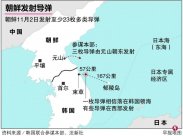(Washington Composite Electric) U.S. senior officials explained that the US government was worried about the continuous development of nuclear weapons in China, and the two sides should communicate on the potential crisis.
Pentagon pointed out that China is expanding its nuclear forces on a large scale and is moving towards the goal of 1,000 nuclear warheads by 2030.However, Beijing has long refused to negotiate military control with Washington for a long time because the United States already has a larger nuclear arsenal.
The U.S. Department of Defense emphasized in the nuclear situation evaluation published on October 27 that the global nuclear danger is increasing.The report said that due to the huge arsenal and aggression in Russia, as well as China's rapidly increasing nuclear arsenal, are potential opponents of the US nuclear weapon plan.
The US State Department's military reserve control, verification and compliance affairs deputy assistant Secretary of State Bell on Tuesday (November 1) attending a seminar on the Washington Think Tank Atlantic Council said that the United States is urging China to conduct bilateral dialogue on nuclear forces and passMultilateral forums to reduce risks and reduce misjudgment of each other by maintaining communication.
Bell said at this seminar held in this nuclear situation: "As the first step, we really want to talk to them on each other's arguments, crisis communication, and crisis management." He said, Washington and with them.Russia has made such conversations for decades.He said: "Now the 60th anniversary of the Cuban missile crisis ... We must sit at the table to discuss." Bell refers to the edge of the Nuclear War in 1962 because the Soviet Union deployed missiles in Cuba.
US National Security Consultant Sarawon said last year after the Chinese official and US President Biden said on the phone that the two agreed to "start to promote the discussion on strategic stability."However, Chinese officials stated at the Communist Party Congress in October this year that China will strengthen its strategic deterrence, which is often used to refer to nuclear weapons.
The US Department of Defense, deputy assistant minister Johnson, the deputy assistant minister of nuclear weapons and anti -large -scale lethal weapons policies, said at the seminar that the United States hopes to communicate with China on a "more basic thing in the number of warheads".He said: "Let's talk about setting up some guardrails in the relationship so that we will not have unnecessary crises."
Johnson added that if China is unwilling to conduct bilateral communication, it must prove through action, such as "showing some transparency of its nuclear construction" by disclosing its in inventory of its civilian purposes.He said: "The Chinese have stopped doing so, which is really worrying."


